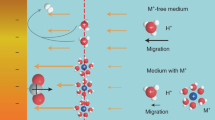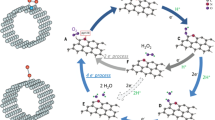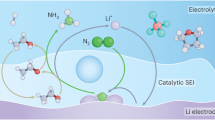Abstract
THE nitrides and carbides of the metals in groups IVB and VB of the Periodic Table have been studied during the course of investigations with a view to developing fuel cell catalysts for oxygen (O2) reduction in alkaline electrolyte. In general, the carbides show considerably more oxygen reduction activity than do the pure metals. By simple atomic consideration this can be attributed to the presence of carbon, which per se is a good catalyst for the reduction of oxygen to hydrogen peroxide. The nitrides exhibit more activity than does the pure metal, but to a lesser degree than the carbides. Of special interest is the nitride of titanium, which shows considerably more activity for oxygen reduction than does pure titanium. In contrast to other metals titanium nitride is more active than titanium carbide.
This is a preview of subscription content, access via your institution
Access options
Subscribe to this journal
Receive 51 print issues and online access
$199.00 per year
only $3.90 per issue
Buy this article
- Purchase on Springer Link
- Instant access to full article PDF
Prices may be subject to local taxes which are calculated during checkout
Similar content being viewed by others
References
Gilles, J. C., Lejus, A. M., and Collongues, R., Corrosion–Anticorrosion, 12 (3), 99 (1964).
Author information
Authors and Affiliations
Rights and permissions
About this article
Cite this article
GINER, J., SWETTE, L. Oxygen Reduction on Titanium Nitride in Alkaline Electrolyte. Nature 211, 1291–1292 (1966). https://doi.org/10.1038/2111291b0
Issue Date:
DOI: https://doi.org/10.1038/2111291b0
This article is cited by
-
Advanced Noncarbon Materials as Catalyst Supports and Non-noble Electrocatalysts for Fuel Cells and Metal–Air Batteries
Electrochemical Energy Reviews (2021)
-
Zirconium nitride catalysts surpass platinum for oxygen reduction
Nature Materials (2020)
Comments
By submitting a comment you agree to abide by our Terms and Community Guidelines. If you find something abusive or that does not comply with our terms or guidelines please flag it as inappropriate.



